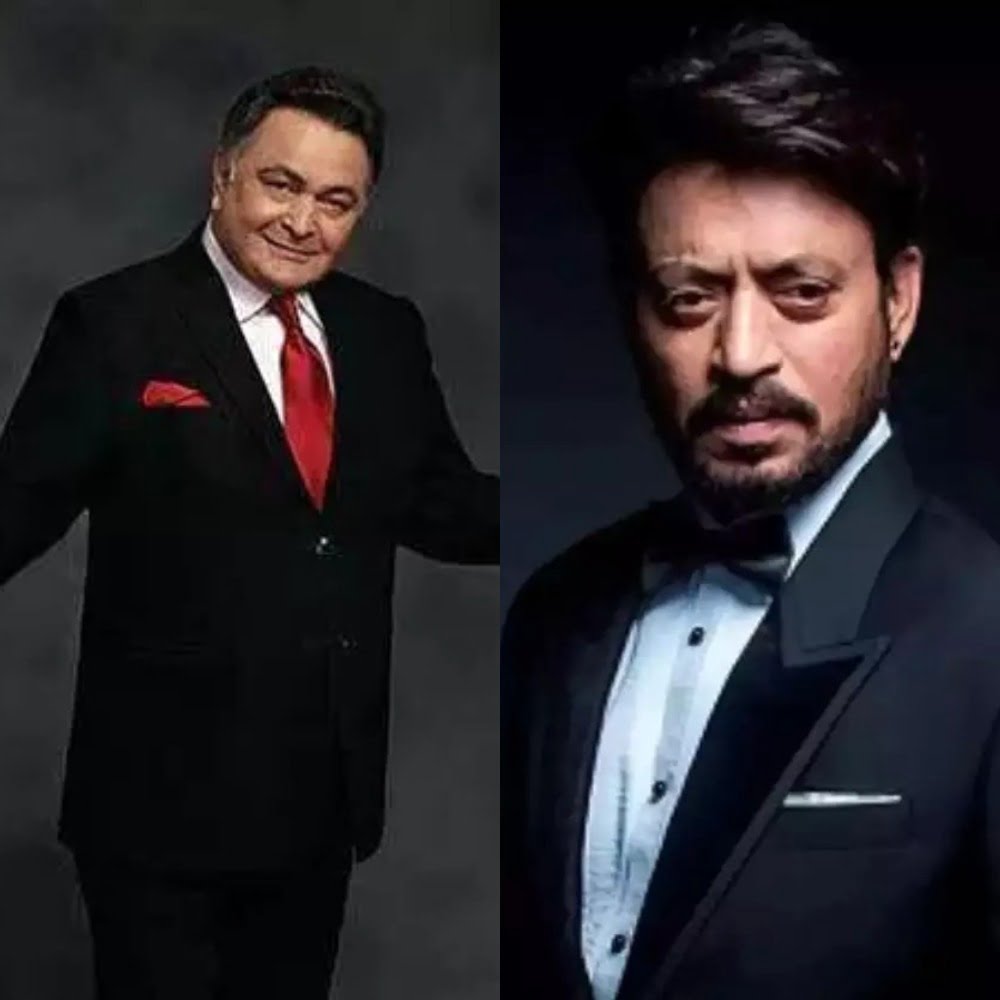Rishi Kapoor After Irrfan: Actors Leave A Permanent Void In Indian Cinema

It is not easy to put Rishi Kapoor and Irrfan Khan in one story. They were so unlike each other, almost from two different planets. They belonged to different generations, separated by one-and-half a decade. That is quite a long time in an industry where trends change at breakneck speed.
One was born into a rich legacy of films, the other a self-made man who fought his way to build his own legacy. Both represented different schools of acting, and as screen personalities they were like chalk and cheese, one an extrovert who loved being cheery and full of life, and the other an introvert who made restraint and quiet dignity his hallmark. One straddled several generations in Indian cinema, the other traversed only a part of it.
It is foolish to even compare both. With such a big chasm between them one wouldn’t know where to start. But their passing in two days is certainly a big loss to the entertainment industry and to the creative community in general. It is best to treat each separately.
RISHI KAPOOR: To call Rishi Kapoor the king of romance would be an insult to him. He was romance itself. No one looked better with a guitar than him, no one did justice to pristine white clothes as he did and no one made running around trees and in meadows and valleys as sexy as him. For the generations of the 1970s and beyond the word heartthrob conjured only one image, that of Rishi Kapoor. Others sought to capture that slot every now and then, but Rishi had sealed it for himself. He was the original, others were pretenders. It was like the Angry Young Man tag belonging Amitabh Bachchan. Others were angrier and maybe better, but only one man had sole claim to the title.
It would be unfair to tie him to that one image though. His rich filmography tells us about his versatility as an actor. In the later phase of his life he was experimenting a lot, playing killer, sleuth, patriarch of a Muslim family trying to regain its honour, to a middle class man fancying to buy a car, to grand old man of a dysfunctional family and similar such roles. Towards the end, he had turned the muse for young directors seeking to reinvent and re-reinvent Rishi Kapoor the phenomenon. He seemed to be relishing the new challenges thrown at him.
Yet the overwhelming image of the actor for several generations of film viewers would be that of the lover boy. Movies such as ‘Bobby’, ‘Laila Majnu’, ‘Sargam’, ‘Chandni’, ‘Henna’, ‘Prem Rog’ and ‘Saagar’, to name only a few, reinforced his image as Hindi cinema’s perennial romantic. Nobody minded when he wooed women across generations. He always seemed the perfect man to do it. He had the licence.
Rishi Kapoor was such a presence that it is difficult to capture his persona in one article. His death sure would leave a permanent hole in our lives.
IRRFAN KHAN: If eyes were actors, Irrfan Khan’s would win awards every time. They spoke a lot, and spoke eloquently. They became characters that he played, and breathed every nuance in them with felicity that is hardly commonplace. Intense, brooding and reflective, they could be playful too. No wonder he fit into several genres of films with ease.
From the revenge-seeking rebel in ‘Paan Singh Tomar’ to the morally conflicted ‘Maqbool’ in the eponymous film to the scheming and violent Ranvijay in ‘Haasil’ to a pained parent in ‘The Namesake’ to the unsophisticated yet full of heart father to an ambitious girl in ‘Angrezi Medium’, he essayed a wide range of roles with consummate authority. And those eyes carried the many moods and idiosyncrasies of the characters with elegance that was understated yet expressive.
“Maara bhai daru pi ke jhut nahin bolega,” Irrfan’s character Champak Bansal in ‘Angrezi Medium’, his last movie, asserts at the school function of his daughter as he goes on berating a judge, who shares the stage, for accepting a Rolex watch from his brother Gopi to pass a verdict against him. This comes immediately after he wins the appreciation of his daughter for stitching together a speech in broken English. The judge, it soon transpires, is the spouse of the school’s principal. The justification for his accusation that his brother cannot tell a lie when he is drunk is hilarious, as is his whole act of undoing something good he has just done for his daughter.
With some other actor the humour in the scene could have turned caricaturish or pure slapstick. Not so with Irrfan. His eyes demanded respect even when his characters appeared frivolous. They lent certain gravitas to his persona. ‘Angrezi Medium’ surely, was not one of his better films, but he stood out for the dignity and grace he brought to his character. This goes for all his roles.
That the deadpan countenance of the man was capable of terrific subtleties was not missed by directors looking for quality acting in sensible cinema. He grew in a period when mainstream cinema had lost the plot, literally and metaphorically, and art house was struggling to shed its ‘boring’ tag and find better ways to connect to the sundry film lover. The search for relatable stories and relatable characters spurred the demand for actors who could essay complex roles without being overbearing and who were sharp to grasp the nuances of human behaviour. Irrfan fit right in.
He had so much to deliver. Sad he won’t.

Comments are closed.